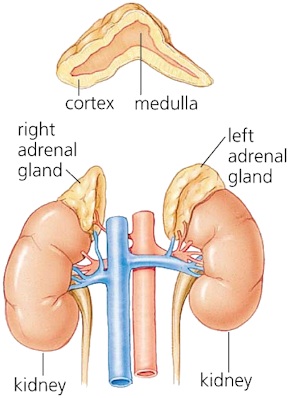Adrenal Glands

Don’t let their size fool you
No bigger than a walnut and weighing less than a grape, each of your two adrenal function glands sits like a tiny pyramid on top of a kidney (“ad” “renal” means “over” the “kidneys”). But don’t let their size fool you; these powerful little endocrine glands manufacture and secrete steroid hormones such as Cortisol, oestrogen and testosterone that are essential to your health and vitality. They not only significantly affect the functioning of every tissue, organ and gland in your body, they also have important effects on the way you think and feel. Without the hormones the adrenals produce you would die.
The main purpose of your adrenals is to enable your body to deal with stress from every possible source, ranging from injury and disease to work and relationship problems. They largely determine the energy of your body’s responses to every change in your internal and external environment. Whether they signal attack, retreat or surrender, every cell responds accordingly, and you feel the results. It is through the actions of the adrenal hormones that your body is able to mobilize its resources to escape or fight off danger (stress) and survive. In a more primitive society that would mean being able to run away quickly, fight or pursue an enemy or game, endure long periods of physical challenge and deprivation, and store up physical reserves when they’re available. In modern society, these same responses are triggered by such circumstances as a difficult boss, air pollution, family quarrels, financial problems, too little sleep, illness and overindulgence in or sensitivities to food or drugs. If your adrenal function is low, as it is in Adrenal Fatigue, your body cannot respond and adapt properly to these stresses. This can lead to a variety of physical and psychological health problems that are themselves a further source of stress.
It is also your adrenal glands’ job to keep your body’s reactions to stress in balance so that they are appropriate and not harmful. For example, the protective activity of anti-inflammatory and anti-oxidant adrenal hormones like Cortisol helps to minimize negative and allergic reactions, such as swelling and inflammation, to alcohol, drugs, foods, environmental allergens, cancer, infection, and autoimmune disorders. These hormones closely affect the utilization of carbohydrates and fats, the conversion of fats and proteins into energy, the distribution of stored fat (especially around your waist and at the sides of your face), normal blood sugar regulation, and proper cardiovascular and gastrointestinal function. After mid-life (menopause in women), the adrenal glands gradually become the major source of the sex hormones circulating throughout the body in both men and women. These hormones themselves have a whole host of physical, emotional and psychological effects, from the level of your sex drive to the tendency to gain weight. Every athlete knows that steroids (adrenal hormones) affect muscular strength and stamina.
Even your propensity to develop certain kinds of diseases and your ability to respond to chronic illness is influenced significantly by the adrenal glands. The more chronic the illness, the more critical the adrenal response becomes. You cannot live without your adrenal hormones and, as you can see from this brief overview, how well you live depends a great deal on how well your adrenal glands function.
Depression
The adrenals have an effect on mental states. As a result, people with Adrenal Fatigue show a tendency toward increased fears, anxiety and depression, have intervals of confusion, increased difficulties in concentrating and less acute memory recall. They often have less tolerance than they normally would and are more easily frustrated.
When the adrenals are not secreting the proper amount of hormones, insomnia is also one of the likely outcomes.
Mild depression is a chief sign of Adrenal Fatigue and, although there are other conditions that cause clinical depression, a saliva test for adrenal hormones will determine whether the adrenals are involved.
Cortisol, DHEA, testosterone and oestrogen are all produced in the adrenals. Decreased levels of each of these hormones have been shown in various scientific studies to be associated with depression. The adrenals secrete all of these hormones. Therefore it is easy to see how Adrenal Fatigue can play a key causal role in depression.
Dental Problems Related to Adrenal Fatigue
Another common source of adrenal burdens is the mouth. This includes tooth abscesses, cracked or decayed teeth, root canals with sub-acute infections, periodontitis, gingivitis and other gum infections, improperly extracted teeth with smoldering infections in the socket where the tooth used to be, mercury fillings leaking into the body (mercury directly suppresses cortisol levels), dental materials that provoke sensitivities, and poor dental work that irritates the teeth, gums or inside of the cheek.
Unresolved dental problems are common but often unrecognized sources of stress and Adrenal Fatigue. The use of mercury amalgams has been a continual, yet vehemently denied, source of toxicity. Mercury is a specific toxin of the adrenals, directly suppressing adrenal hormone output. If Adrenal Fatigue symptoms started within a few months of having particular dental work, the dental work might be an important factor in restoring health, as any one of these dental problems can hamper the ability to heal.
It is best to have teeth checked by a dentist who does not use amalgam (silver) fillings and who practices dentistry with an awareness of the importance of the mouth and teeth to overall health. Unfortunately, most dental schools do not provide much training in the specific ways and means by which the mouth tremendously influences total health, or in methods of inspecting and treating the mouth and teeth within this total body context. They also do not typically include instruction about individual sensitivities to dental materials or the use of alternative safe materials.
